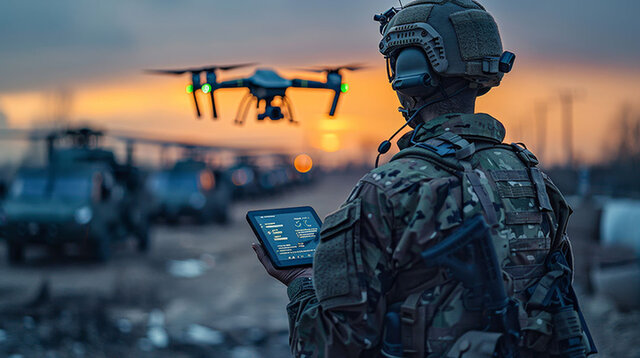Defense innovation
The future of command: AI-driven decision-support systems in defence
As military operations grow increasingly complex, artificial intelligence (AI) is emerging as a critical enabler for defence decision-making.
AI-driven decision-support systems (DSS) provide commanders with real-time insights, predictive analytics, and automated recommendations, enhancing situational awareness and operational efficiency. This article examines the advancements, applications, challenges, and future outlook of AI in defence command systems, highlighting the transformative potential of these technologies.
The role of AI in defence decision-support systems
AI enhances decision-making by processing vast amounts of data and delivering actionable insights quickly. Key capabilities include:
- Real-time data analysis
AI systems aggregate and analyse data from multiple sources, such as sensors, satellites, and reconnaissance missions, to provide a comprehensive operational picture. - Predictive analytics
Machine learning models identify patterns and trends in historical and real-time data, enabling predictive insights into enemy movements, logistical needs, and resource allocation. - Scenario modelling and simulation
AI-driven simulations allow commanders to evaluate multiple courses of action (COAs) in real time, identifying the most effective strategies based on operational goals. - Autonomous system integration
Decision-support systems integrate with autonomous vehicles and drones, enabling coordinated operations and improving battlefield efficiency.

Applications of AI-driven decision-support systems
- Battlefield management
AI enhances situational awareness by integrating data from surveillance systems, ground troops, and allied forces. The UK’s Defence Science and Technology Laboratory (DSTL) has developed AI systems for threat detection and resource optimisation in complex combat environments. - Logistics and supply chain optimisation
AI-driven DSS streamline logistics by predicting supply chain disruptions, optimising inventory, and ensuring timely delivery of resources to frontline units. - Cyber defence
AI systems monitor network activity, detect anomalies, and respond to cyber threats in real time, protecting critical military infrastructure from cyberattacks. - Mission planning and execution
AI assists in mission planning by evaluating terrain, weather, and enemy positions to create optimal strategies. For example, NATO’s Allied Command Transformation is experimenting with AI tools for mission execution support. - Personnel management
AI-driven tools assess troop readiness, recommend training schedules, and forecast personnel needs, ensuring optimal force deployment.
AI-driven DSS streamline logistics by predicting supply chain disruptions, optimising inventory, and ensuring timely delivery of resources to frontline units.
Case studies in AI-driven decision-support systems

Developing defences against adversarial AI tactics, such as data poisoning and spoofing, will be a top priority for ensuring the reliability of AI systems.
- Project Maven (USA)
The US Department of Defense launched Project Maven to enhance intelligence analysis using AI. The system processes drone footage to identify objects and patterns, significantly reducing the workload on human analysts. - UK’s autonomous warrior programme
The British Army’s initiative integrates AI with unmanned systems to provide decision-support in battlefield scenarios. The programme includes real-time threat detection and automated coordination of assets. - Israel’s Iron Dome
This advanced missile defence system leverages AI to identify incoming threats, prioritise targets, and intercept missiles with unparalleled precision.
Challenges in implementing AI-driven DSS

The use of AI in defence raises ethical questions, such as accountability for autonomous actions and the potential misuse of AI technologies.
- Trust and transparency
Building trust in AI systems is critical, especially in high-stakes military scenarios. Commanders need transparency in AI recommendations to understand the rationale behind decisions. - Data quality and availability
The accuracy of AI-driven DSS depends on the quality and availability of data. Gaps or biases in data can lead to flawed recommendations. - Integration with legacy systems
Many defence organisations rely on legacy systems that are not easily compatible with AI technologies. Overcoming this challenge requires significant investment in modernisation. - Ethical and legal concerns
The use of AI in defence raises ethical questions, such as accountability for autonomous actions and the potential misuse of AI technologies.
While challenges related to trust, data quality, and ethics remain, the potential benefits of these systems far outweigh the risks.
The UK’s role in advancing AI-driven DSS
The UK has positioned itself as a leader in AI for defence through strategic investments and collaborations:
- Defence AI Strategy (2022):
The UK’s Defence AI Strategy outlines a vision for integrating AI into military operations, focusing on innovation, collaboration, and ethical use. - DSTL’s AI initiatives
The Defence Science and Technology Laboratory (DSTL) has been instrumental in developing AI systems for decision-support, including tools for surveillance, threat analysis, and logistics. - Collaboration with allies
The UK collaborates with NATO and Five Eyes partners to standardise AI practices and share knowledge, ensuring interoperability in joint operations. - The AI Centre of Excellence
Established by the Ministry of Defence, the AI Centre of Excellence supports research and development in AI-driven DSS, fostering partnerships with industry and academia.
Future directions for AI-driven DSS in defence
- Human-AI collaboration
The future of AI in defence lies in augmenting, not replacing, human decision-making. AI systems will act as trusted advisors, providing commanders with enhanced capabilities while retaining human oversight. - Advanced autonomous systems
AI integration with autonomous platforms will enable more sophisticated coordination between unmanned vehicles, improving operational efficiency. - Quantum computing integration
Quantum computing will revolutionise AI-driven DSS by enabling faster data processing and more accurate predictions. - Global ethical standards
Establishing international standards for the ethical use of AI in defence will be crucial to mitigating risks and fostering responsible innovation. - Resilience against adversarial AI
Developing defences against adversarial AI tactics, such as data poisoning and spoofing, will be a top priority for ensuring the reliability of AI systems.
Conclusion
AI-driven decision-support systems are transforming defence operations by providing enhanced situational awareness, predictive analytics, and operational efficiency. While challenges related to trust, data quality, and ethics remain, the potential benefits of these systems far outweigh the risks. The UK’s strategic investments and collaborative efforts position it as a global leader in this domain. By focusing on human-AI collaboration and ethical innovation, the defence sector can unlock the full potential of AI-driven DSS, ensuring effective and responsible command in the complex operational environments of the future.